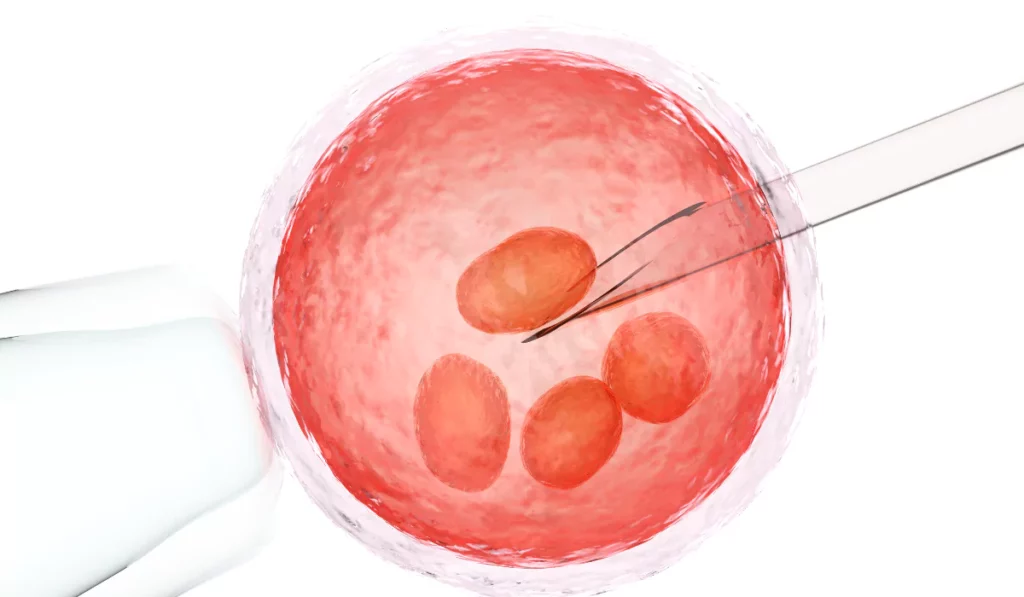Infertility is a problem where someone has trouble getting pregnant or staying pregnant. It’s way more common than you may think. The World Health Organization (WHO) tells us that about one in every six adults of reproductive age faces infertility at some point in their life.
Infertility can really affect a person’s or a couple’s body, mind, and how they fit into society, not to mention their family and community.
In this article, we will dive into how genetics and infertility are linked, discussing diseases causing infertility, if infertility is inherited, and whether are there solutions to it.
Quick Overview:
There are many reasons why someone might have difficulties in conceiving, but one key area is genetics.
Certain genetic issues can make it hard for both men and women to conceive or to carry a baby through a full pregnancy.
However, is infertility just hereditary? Well, it’s not just genetics that plays a role in infertility. Age, how we live our lives, things in our environment, infections, hormone problems, and physical issues can also contribute to problems with getting pregnant.
If you want to know all the details about how genetics and other things can make it hard to have a baby, and what can be done about it, you should read the full article.
Understanding Infertility
Infertility is when a person or a couple has trouble having a baby. It means that you can’t get pregnant even after trying for a while.
Normally, if you haven’t gotten pregnant after one year of trying without using birth control, doctors might say you have infertility. This time could be shorter or longer based on how old you are, your health, and other things.
There are a few kinds of infertility.
Primary infertility means you’ve never been pregnant before and are finding it hard to conceive.
Secondary infertility is when you’ve been pregnant before but are now having difficulties in conceiving again. And sometimes, the reason for infertility isn’t clear, even after tests are done.
Many things can cause infertility, and it can be some issues with you, your partner, or both. Here are some common reasons:
- Lifestyle choices like smoking, drinking alcohol, using drugs, stress, being overweight, or not eating well.
- Health issues like diabetes, problems with your thyroid, polycystic ovary syndrome (PCOS), endometriosis, pelvic inflammatory disease (PID), or sexually transmitted infections (STIs).
- Age plays a big part too. Fertility goes down as you get older, especially after 35 for women and 40 for men.
- Genetic factors, which are about the information you inherit from your parents. This can include things like changes in your chromosomes, gene mutations, or inherited disorders that can lead to problems with getting pregnant.
Infertility Tests
If you’re having a conceiving problem, you might want to get a fertility check-up.
This includes several tests to see how your reproductive system is working and to find any issues that could affect your ability to have a baby.

This check-up could involve:
- Blood tests, to look at your hormones, check for infections, or see if there are any genetic infertility issues.
- Semen analysis, if you’re a man, to see how many sperm you have, how they move, and if they’re healthy.
- Ultrasound, to check out your ovaries, uterus, and fallopian tubes.
- Hysterosalpingogram (HSG), a special X-ray to make sure your fallopian tubes aren’t blocked.
- Laparoscopy, a small surgery to look inside your belly and fix any issues like endometriosis or scar tissue.
A fertility assessment helps you and your doctor figure out the best way to help you get pregnant.
Depending on what’s causing the infertility, you might get medicine, surgery, or try assisted reproductive technologies (ART) like intrauterine insemination (IUI) or in vitro fertilization (IVF). These treatments can boost your chances of having a baby.
Genetics in Infertility
Genetics is about how parents pass down traits to their kids. Traits are things like your eye color, blood type, or how tall you are. Your genes, which are parts of your DNA, decide these traits.
You get one set of genes from your mom and one from your dad. Sometimes, genes change a bit, and these changes are called mutations.
Some of these mutations can mess with your ability to have kids, which is a big part of your reproductive health.
Reproductive health involves many things like hormones, organs, and gametes (sperm for men, eggs for women).
For a baby to start growing, a sperm and an egg need to come together, which is called fertilization.
If there’s a genetic problem, it can lead to infertility. This can happen to both men and women and can be because of different reasons. Let’s look at some genes that are important for fertility:
- NR5A1: This gene helps with growing and working of adrenal glands (they make important hormones) and with forming testes in men and ovaries in women. If there’s a problem with this gene, it can lead to disorders of sex development (DSD), where someone’s genitals might not match their chromosomes or hormones. This can lead to fertility problems like low sperm count, poor egg quality, or early menopause.
- FMR1: This gene is key for how your brain grows and works. It also affects how women’s eggs are made and their quality. Changes in this gene can cause fragile X syndrome, which impacts learning, behavior, and how you look. Some women with this syndrome might still be able to have kids, but others might get primary ovarian insufficiency (POI), where their ovaries stop working before age 40. This can lead to irregular periods, low estrogen levels, and difficulties in conceiving.
- KAL1: This gene is part of the development and function of the hypothalamus and pituitary gland in your brain, which control many of your hormones. It also affects your nose and eyes. If this gene changes, it can cause Kallmann syndrome, which affects your sense of smell and when you start puberty. People with this condition might have low sex hormone levels, which can lead to puberty happening late or not at all, small genitals, and infertility.
These are just a few examples of genes that can affect whether you can have kids. There are many more genes linked to reproductive health, and scientists might not even know about some yet.
Genetic testing can find some causes of infertility and help choose the right treatment.
But as I said earlier not all infertility is caused by genetics; sometimes it’s because of things in your environment, your lifestyle, or reasons we don’t know yet.
If you’re worried about having problems with getting pregnant, it’s a good idea to talk to your doctor for advice and help.
Is Infertility Inherited?
Infertility, a complex condition affecting many couples, can indeed have hereditary factors. Genetics plays a crucial role in determining reproductive health.
As we will discuss later in this article, certain inherited conditions, like Klinefelter syndrome in men or Turner syndrome in women, directly impact fertility. Genes like FMR1, associated with fragile X syndrome, can also influence reproductive capabilities, leading to issues such as premature ovarian failure (POF).
Furthermore, polycystic ovary syndrome (PCOS), often seen in family histories, can be a genetic contributor to infertility in women.
While not all infertility cases are inherited, the presence of specific genetic markers or mutations in families can significantly increase the risk.
Genetic Causes of Infertility in Women
There are many reasons women might have trouble getting pregnant, like hormone issues, physical problems, infections, or things in their environment.
Sometimes, these reasons are linked to genetics, which means they come from the genes you get from your parents.
Genetics Disorders That Cause Female Infertility
One common genetic reason for infertility in women is polycystic ovary syndrome (PCOS).
PCOS changes how your ovaries work, leading to irregular periods, too much hair growth, acne, and weight gain.
It also makes it harder for you to release an egg each month, lowering your chances of getting pregnant. PCOS often runs in families, so it might be partly inherited.
Scientists have found a few genes that might play a part in PCOS, but they’re still figuring out exactly how it works.
Another genetic issue causing fertility problems in women is premature ovarian failure (POF). POF is when your ovaries stop working before you turn 40, which means you stop having periods and making eggs.
It can be caused by things like autoimmune diseases, chemotherapy, or radiation. But in some cases, it’s linked to genetic disorders like Turner syndrome or fragile X premutation.
Turner syndrome happens when a woman is born with just one X chromosome. Fragile X premutation is a change in a gene called FMR1 on the X chromosome.
These conditions can mess up how your ovaries grow and work, leading to POF.
Other genetic conditions affecting a woman’s ability to have kids include Kallmann syndrome, where the brain doesn’t make enough of a puberty-starting hormone; and endometriosis, where tissue from inside the uterus grows outside it.
Both conditions can be caused by genetic changes and can make it hard for an egg to be released or for a fertilized egg to settle in the uterus.

Figuring out these genetic causes of infertility in women can help doctors give better advice and treatment to women having difficulties in conceiving.
Genetic Causes of Infertility in Men
About 20% of men can’t have children and genetics can be behind some of these infertility cases.
Genetic causes of male infertility are varied and complex. They can affect how sperm are made, their quality, or how they work.
These genetic disorders include:
Y Chromosome Microdeletions and Male Infertility
Men have an X and a Y chromosome, while women have two Xs. The Y chromosome has genes important for male development and making sperm.
Sometimes, small parts of the Y chromosome are missing, called microdeletions. These can lead to problems in making or the quality of sperm.
For example, microdeletions might cause no sperm in semen or a low sperm count, making it hard or impossible to father a child naturally.
These microdeletions can be spotted through a genetic test called a karyotype, which looks at a person’s chromosomes.
Depending on where and how big the microdeletion is, there are different types, like AZFa, AZFb, AZFc, or AZFd, each affecting fertility differently.
Treatments might include assisted reproductive technologies (ART) or using a sperm donor.
Klinefelter Syndrome and Other Genetic Disorders
Klinefelter syndrome is when a man has an extra X chromosome, making his karyotype 47,XXY.
This extra chromosome can mess up how the male reproductive system develops, leading to low testosterone, small testes, enlarged breasts, and infertility.
Most men with Klinefelter syndrome have little or no sperm, but some might have enough for ART.
This syndrome can be identified through a karyotype test or a blood test checking sex hormone levels.
Other genetic disorders causing male infertility include Noonan syndrome, affecting body development including the genitals, and cystic fibrosis, impacting the lungs and digestive system and possibly causing the vas deferens (the tube carrying sperm) to be missing.
These can be diagnosed through specific genetic tests.
The Role of Genetics in Sperm Quality and Production
Genetic factors can also impact sperm. Single gene mutations can mess up sperm development or function.
Examples include
- CFTR gene: Mutations in this gene cause cystic fibrosis, a condition affecting multiple organs, including the male reproductive system. These mutations can disrupt chloride transport in sperm, hindering their motility (swimming ability) and ultimately fertilization.
- AR gene: The androgen receptor (AR) plays a crucial role in testosterone signaling, essential for sperm maturation and production. Mutations in the AR gene can disrupt this signaling, leading to abnormal sperm development, reduced sperm count, and even complete absence of sperm (azoospermia).
- FSHR gene: Follicle-stimulating hormone (FSH) is a key hormone for sperm production. Mutations in the FSHR gene can impair FSH signaling, leading to decreased sperm production and potentially lower sperm quality.
- Genes involved in sperm structure and function: Mutations in these genes can affect the shape, size, or even the flagellum (tail) of sperm, impacting their motility and ability to reach and fertilize the egg.
- Genes regulating hormone production and signaling: Hormones like testosterone and FSH are crucial for sperm production. Mutations in genes involved in their production or signaling pathways can significantly affect sperm quality and quantity.
Epigenetic modifications, changes in DNA that don’t alter the sequence but affect gene activity, can also influence genes involved in sperm development.
These modifications can be caused by environmental factors like diet, stress, smoking, or exposure to toxins.
Recent Research and Statistics
Recent studies show that genetic causes of male infertility are more common and complex than once thought.
About 40% of infertile men have a detectable genetic issue through current tests. But 60% have unknown genetic causes, possibly due to new mutations or gene-environment interactions not yet discovered.
Research is now using advanced techniques like next-generation sequencing (NGS), genome-wide association studies (GWAS), and epigenome-wide association studies (EWAS) to find new genetic factors linked to male infertility.
These studies are finding new mutations, genetic pathways, and mechanisms involved in infertility, which could lead to better diagnosis and treatments.
However, these techniques also bring challenges, like needing large sample sizes, validating findings, interpreting results, and handling the ethical aspects of genetic information.
So, genetic testing can diagnose some issues and guide treatments like ART. But many genetic causes of male infertility are still unknown, needing more research and new technologies.
These advances could uncover new genetic factors involved in male infertility, enhancing the treatment and success for men and their partners struggling to have children.
Genetic Testing and Infertility
Genetic testing looks for specific changes or mutations in your genes that might be linked to having trouble getting pregnant.
This kind of testing can pinpoint the reason for infertility, figure out if there’s a chance of passing a genetic issue to a child, and help choose the right method for assisted reproductive technology (ART).
Different types of genetic tests are used for fertility issues, depending on what you need to know. Here are some common ones:
- Karyotyping: This test checks the number and structure of chromosomes in a cell. Chromosomes carry your genetic info in DNA. Usually, people have 46 chromosomes, in 23 pairs. But sometimes, someone might have an extra or missing chromosome, or their chromosomes might be arranged differently, which can affect their ability to have kids and the health of their future children. For example, Klinefelter syndrome in males, where there’s an extra X chromosome, can lead to a low sperm count or no sperm at all. Karyotyping can spot these chromosome issues and help decide on treatment.
- Gene-specific tests: These tests look for changes in specific genes linked to infertility or genetic disorders. For example, cystic fibrosis (CF) affects the lungs and other organs and is caused by changes in the CFTR gene. CF can also lead to infertility in men by blocking the tubes that carry sperm. These tests can find CFTR mutations in both partners and help figure out the chances of having a child with CF.
- Preimplantation genetic testing (PGT): This is done on embryos made through in vitro fertilization (IVF) before putting them into the uterus. PGT checks the embryos for chromosome problems (PGT-A) or specific genetic disorders (PGT-M). It helps pick the healthy embryos for implantation, improving the chance of a successful pregnancy and reducing the risk of miscarriage or birth defects.
Genetic testing for infertility isn’t straightforward. It’s important to weigh the pros and cons and think about the emotional and ethical sides of it.
That’s where genetic counseling comes in. Genetic counseling helps you understand the genetics behind infertility, what the test can and can’t do, what the results might mean, and your options and resources.

It’s a way to help you make informed decisions about your reproductive health and future.
But genetic testing for infertility also brings up some ethical issues:
- Privacy and confidentiality: Your genetic info is very personal and could affect you, your partner, and your family. Keeping genetic test results private and getting consent before sharing this info is crucial.
- Access and equity: These tests and counseling can be costly and not always easy to get, especially in areas with fewer resources. This can lead to unequal access to care for people with fertility issues. Plus, there’s the risk of discrimination or stigma based on genetic status or reproductive choices.
- Values and beliefs: Genetic testing and counseling can touch on deep and complex issues that might clash with personal, religious, or moral beliefs. Some might object to IVF or PGT, or might prefer adopting over using ART. It’s important to respect everyone’s unique views and choices and offer non-judgmental, supportive care.
Non-Genetic Factors and Their Interaction with Genetics
Not just genetics, but also many things around us and how we live can impact our ability to have kids. Here are some of these factors:
- Nutrition, weight, and exercise: If you’re overweight, it can lower sperm count and quality in men and cause problems with egg release in women. Being too thin can also harm the way ovaries work and fertility in women. Eating well and getting regular, moderate exercise can make your reproductive system healthier.
- Stress: Both physical and mental stress can mess with your hormone balance and affect egg release in women and sperm making in men. Doing things like meditation, yoga, and getting counseling can help lessen stress and boost your fertility.
- Environmental and job-related exposures: Some chemicals, pollutants, and toxins can affect eggs and sperm, reducing their number and quality. For instance, being around pesticides, heavy metals, and chemicals that disrupt hormones can harm fertility in both men and women. Staying away from or cutting down on these harmful substances can help keep your reproductive health safe.
- Substance and drug use: Smoking, drinking alcohol, having too much caffeine, and using illegal drugs can all negatively impact fertility in men and women. Smoking can harm the DNA in eggs and sperm, raising the risk of miscarriage and birth defects. Alcohol can affect egg release and sperm quality, and lower the chances of a fertilized egg settling in the womb. Caffeine can mess with hormone levels and affect fertility and pregnancy. Illegal drugs like marijuana, cocaine, and heroin can harm sperm function and egg release, and be dangerous for a baby. Quitting or cutting down on these things can make getting pregnant easier and lead to better pregnancy results.
Sometimes, how your genes and your environment work together can also affect your chances of having kids.
This means some people might have a higher or lower risk of fertility issues based on their genes and their surroundings.
For example, certain genetic changes might make people more sensitive to stress, being overweight, or toxins affecting their ability to have children.
On the other hand, some genes might protect against these negative impacts on fertility.
Another key thing to consider is epigenetics, which is about changes in how genes work without changing the DNA itself.
These changes can be caused by your environment and lifestyle and can affect how the reproductive system develops and works.
For example, epigenetic changes in sperm and eggs can impact their quality and ability to fertilize and implant in the womb.
These changes can also happen in an embryo, affecting its growth and development.
These epigenetic changes can be passed down from parents to children, influencing their fertility and health. So, epigenetics is a big part of fertility and having children.
Treatment and Management
Can you cure infertility? The straight answer is “maybe” Yes (in some cases). It all depends on what is the cause of infertility and if is there currently any treatment or bypass for that.
Thankfully, there are various treatments available for those with infertility, especially when it’s linked to genetics.
Depending on what’s causing the problem and how serious it is, treatments can include:
- Medications: These are often used to stimulate egg release in women and improve sperm production in men, as well as to balance hormones in both. However, they might not be effective if the underlying cause of infertility is not hormone-related or if the body doesn’t respond to these medications as expected.
- Surgery: This can fix or remove any physical problems or blockages in the reproductive system, like varicoceles in men, fibroids in women, or endometriosis. However, not all conditions are surgically treatable, and surgery carries its own risks and may not always restore fertility.
- Assisted reproductive technologies (ART): These methods help with pregnancy by handling eggs, sperm, or embryos outside the body. The most common types are in vitro fertilization (IVF), where eggs and sperm are put together in a lab and then the embryo is placed in the uterus, and intrauterine insemination (IUI), where sperm is injected right into the uterus. While ART has helped many people, success rates can vary greatly depending on age, the reason for infertility, and the quality of the eggs and sperm.
Besides these treatments, people with fertility problems can change their lifestyle like below to increase the chance of having a kid:
- Eat a healthy diet and keep a good weight.
- Avoid smoking, drinking alcohol, and using drugs.
- Lower stress and try relaxation techniques.
- Get emotional support through counseling or support groups.
- Follow their doctor’s advice and take any prescribed medicines correctly.
With modern science, technology, good medical care, and emotional support, many people with fertility issues can still achieve their dream of becoming parents.

However, it’s crucial to recognize that these methods are not guaranteed solutions for everyone. The reasons why these treatments might not be suitable for all childless couples include:
- Individual health conditions: Certain health issues can make fertility treatments less effective or even risky.
- Age factors: Success rates of fertility treatments typically decrease as people age, particularly for women over 35.
- Financial constraints: Fertility treatments can be expensive, and not all couples can afford them, especially if multiple cycles are needed.
- Ethical or religious beliefs: Some individuals or couples may have ethical or religious beliefs that prevent them from pursuing certain fertility treatments.
- Emotional and psychological impact: The stress and emotional toll of undergoing fertility treatments can be significant, and not everyone may be willing or able to cope with this strain.
- Unexplained infertility: In some cases, the cause of infertility remains unknown despite thorough testing, making it challenging to choose an effective treatment.
Each couple’s journey is unique, and what works for one may not work for another.
Final Words
In conclusion, facing the journey of childlessness can be an incredibly challenging and emotional experience for many couples. It’s a path filled with ups and downs, hopes and uncertainties.
While modern medicine offers a range of treatments for infertility, including medications, surgeries, and assisted reproductive technologies like IVF and IUI, it’s important to recognize that these solutions may not be a fit for everyone.
It can affect both males and females and for those who find themselves on this journey, it’s okay to feel a mix of hope and frustration, optimism and sadness.
It’s a sign of the deep love and care you have for the family you dream of. Taking care of your emotional well-being is just as important as addressing physical health.
Seeking support, whether through counseling, support groups, or confiding in loved ones, can provide comfort and strength.
It’s also essential to make informed decisions based on both medical advice and personal values, always keeping in mind what feels right for you and your partner.
For those who may have to explore other paths to parenthood or even a life different than the one they first imagined, know that your journey is no less valid or important.
There are many options to have kids if you are facing infertility problems as discussed above. However, if you have already gone through them, there are many ways to create a fulfilling life, with or without biological children. The love and care you have to offer are invaluable, whether it’s directed toward adopted children, community involvement, creative pursuits, or each other.
References:
- Infertility – World Health Organization (WHO)
- 1 in 6 people globally affected by infertility: WHO
- Infertility: Types, Causes, Symptoms, Diagnosis & Treatment
- Genetics and Epigenetics of Male Infertility – Frontiers
- Infertility and genetics: male and female factor infertility – PFCLA
- What is Infertility? | CDC
- Evaluating Infertility | ACOG
- RACGP – Assessment of female fertility in general practice
- Infertility – NHS
- Identifying signs of infertility: Symptoms, causes and first steps
- Genetic Karyotyping for Infertility: Why It’s Important – Verywell Family
- What lifestyle and environmental factors may be involved with …
- Epigenetics of Male Infertility: The Role of DNA Methylation
- External and Genetic Conditions Determining Male Infertility – MDPI
- Environment, Lifestyle, and Female Infertility | Reproductive Sciences
- The Future of IVF: The New Normal in Human Reproduction
- Coping Techniques | RESOLVE: The National Infertility Association
- What treatment options are available for male infertility?
- Assisted Reproductive Technology (ART) – NICHD

Dr. Sumeet is a seasoned geneticist turned wellness educator and successful financial blogger. GenesWellness.com, leverages his rich academic background and passion for sharing knowledge online to demystify the role of genetics in wellness. His work is globally published and he is quoted on top health platforms like Medical News Today, Healthline, MDLinx, Verywell Mind, NCOA, and more. Using his unique mix of genetics expertise and digital fluency, Dr. Sumeet inspires readers toward healthier, more informed lifestyles.





